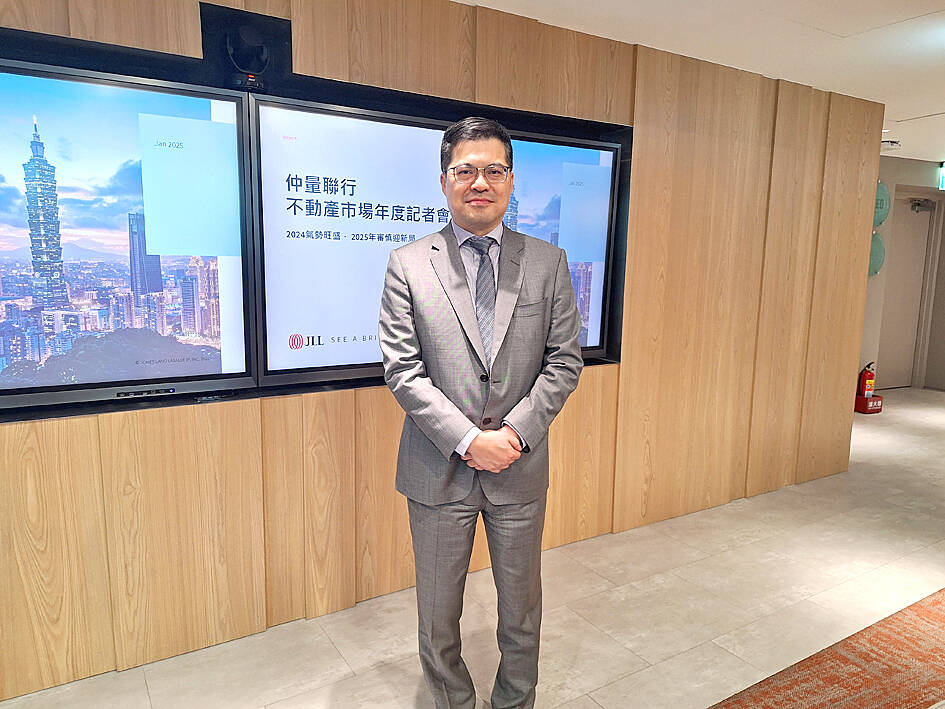Grade-A offices in Taipei last year saw the lowest vacancy rates in Greater China and ranked among the best effective rents in the Asia-Pacific region, helped by strong demand from technology and financial firms, property consultancy and broker Jones Lang LaSalle (JLL) Taiwan said.
Vacancy rates in Taipei’s core business districts hovered at about 5 to 10 percent, on par with Singapore, but lower than the average of above 10 percent seen in Shanghai, Beijing and Hong Kong’s Central District, JLL Taiwan managing director Kevin Hou (侯文信) told a media briefing on Thursday last week.
Taipei’s effective rent — the actual rent achieved by landlords after deducting renovation allowances, moving fees and other concessions — beat other first-tier cities in the region, including Tokyo, Hou said.

Photo: CNA
The figure represented the strongest in the post-COVID-19 pandemic era, although rental hikes showed signs of easing in the past two quarters, JLL Taiwan said.
Rent for the full year climbed 1.4 percent to NT$3,203 per ping (3.3m2), the smallest advance in three years, it said.
Rent hit NT$3,708 per ping in the city’s prime Xinyi District (信義) and averaged NT$2,616 and NT$2,546 in the Dunbei (敦北) and Dunnan (敦南) areas respectively, it said, adding that the average in Nangang District (南港) was NT$2,311.
Rent hikes moderated due to the entry of some large-scale office spaces into the market and growing uncertainty about the global economic outlook, Hou said.
As of Dec. 31 last year, the market had taken up 40 percent of the new supply, but there was still 17,000 ping of inventory to be digested, it said, adding that Nangang still had 7,000 ping left in inventory.
Vacancy rates are forecast to rise this year, with an additional 36,000 ping of Grade-A office spaces joining the market after stripping out and refurbishing some office buildings that were originally intended for self-occupancy, Hou said.
Rental rates are likely to slow further this year, as landlords offer concessions to woo corporate tenants, Hou said.
Companies at home and abroad are worried about US president-elect Donald Trump’s threats of tariff hikes after his inauguration next week and have become cautious about spending, he said.
Taipei would remain competitive going forward, with GDP forecast to grow 3.13 percent this year, faster than in Singapore, Hong Kong, South Korea and Japan, said Sherry Wu (吳瑤華), a senior property investment analyst at JLL Taiwan.
The growth forecast suggests a deceleration from last year’s 4.25 percent increase, but remains resilient, Wu said.

Taiwan will prioritize the development of silicon photonics by taking advantage of its strength in the semiconductor industry to build another shield to protect the local economy, National Development Council (NDC) Minister Paul Liu (劉鏡清) said yesterday. Speaking at a meeting of the legislature’s Economics Committee, Liu said Taiwan already has the artificial intelligence (AI) industry as a shield, after the semiconductor industry, to safeguard the country, and is looking at new unique fields to build more economic shields. While Taiwan will further strengthen its existing shields, over the longer term, the country is determined to focus on such potential segments as

UNCERTAINTY: Innolux activated a stringent supply chain management mechanism, as it did during the COVID-19 pandemic, to ensure optimal inventory levels for customers Flat-panel display makers AUO Corp (友達) and Innolux Corp (群創) yesterday said that about 12 to 20 percent of their display business is at risk of potential US tariffs and that they would relocate production or shipment destinations to mitigate the levies’ effects. US tariffs would have a direct impact of US$200 million on AUO’s revenue, company chairman Paul Peng (彭雙浪) told reporters on the sidelines of the Touch Taiwan trade show in Taipei yesterday. That would make up about 12 percent of the company’s overall revenue. To cope with the tariff uncertainty, AUO plans to allocate its production to manufacturing facilities in

COLLABORATION: Given Taiwan’s key position in global supply chains, the US firm is discussing strategies with local partners and clients to deal with global uncertainties Advanced Micro Devices Inc (AMD) yesterday said it is meeting with local ecosystem partners, including Taiwan Semiconductor Manufacturing Co (TSMC, 台積電), to discuss strategies, including long-term manufacturing, to navigate uncertainties such as US tariffs, as Taiwan occupies an important position in global supply chains. AMD chief executive officer Lisa Su (蘇姿丰) told reporters that Taiwan is an important part of the chip designer’s ecosystem and she is discussing with partners and customers in Taiwan to forge strong collaborations on different areas during this critical period. AMD has just become the first artificial-intelligence (AI) server chip customer of TSMC to utilize its advanced

Chizuko Kimura has become the first female sushi chef in the world to win a Michelin star, fulfilling a promise she made to her dying husband to continue his legacy. The 54-year-old Japanese chef regained the Michelin star her late husband, Shunei Kimura, won three years ago for their Sushi Shunei restaurant in Paris. For Shunei Kimura, the star was a dream come true. However, the joy was short-lived. He died from cancer just three months later in June 2022. He was 65. The following year, the restaurant in the heart of Montmartre lost its star rating. Chizuko Kimura insisted that the new star is still down